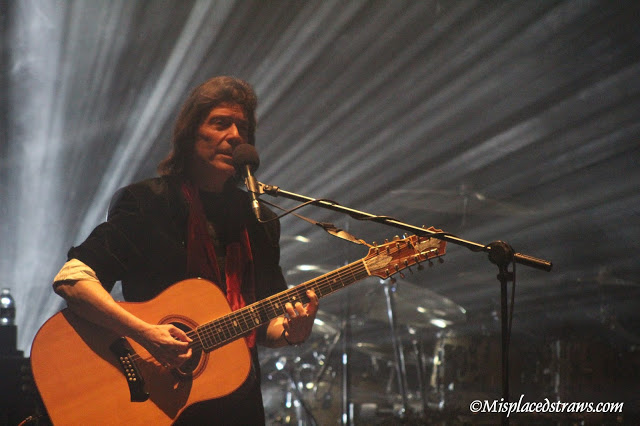Follow MisplacedStraws – Facebook | Twitter | Insta
Few musicians can boast of the career Steve Hackett has enjoyed. Now celebrating his 50th year in music, Hackett has guided effortlessly from his prog roots with Genesis through his rock-oriented solo work and classical, nylon string guitar pieces. He has once again returned to the latter for his new record Under A Mediterranean Sky, a beautiful album that takes the listener on a guided audio tour of some of the most beautiful places on Earth. Steve recently took some time to return to the site and talk about this new record and his 50th anniversary in music.
Please press the PLAY icon below for the MisplacedStraws.com Conversation with Steve Hackett:

On developing the theme for Under A Mediterranean Sky – Well, my wife and I, Jo, in her time, she’s been, a writer, a filmmaker, many things. She comes up with musical ideas that are really, really great as well. It’s normally top-line ideas, but I hear them. So she has quite a bit of input on this stuff, and she’s always keen on variations of things. But we were kicking around the idea of music that had a theme to it. And she was always keen on me using some kind of story. Before that, I was writing a lot of songs and vagueing out on them and finding out if I’d written some lyrics, I’ll find out what it’s all about later, I let the words lead me. But she comes at it from the other perspective of saying, “Well, if you have a story or a concept, it will stretch you into areas that you won’t necessarily normally do.” And she said, “I think with your next acoustic effort, you should try and change it and not just stick with stuff that’s just sort of mid 19th century romantic and baroque influences. But what about the aspect of world music and different regions and places that we visited and being affected by that?” And some of that stuff has permeated the rock albums I’ve done, particularly in recent years. And we thought we’d try and do the same thing with an acoustic album, so-called acoustic album. But how to stretch the boundaries of an acoustic album and make it as orchestral as possible, so that you’ve got the question and answer thing? I think you use the term palate cleanser, it’s a little bit like we tend to have one of one orchestral track with guitar, and then we have one that’s just guitar, the self-orchestrating idea of that. So it’s sort of big picture, small picture, a big picture, small picture to try and give the thing pace. And use some instruments that I would never normally think of using on an acoustic album like the Arabian Oud, the Arabian lute that I’m very bad at playing. But I can manage a few phrases on, I love the sound of it, and we had to the duduk, the Armenian guitar from Azerbaijan. We had some soprano sax and back to the idea of flute and two flutes at times, Plus the incredible string work of Christine Townsend playing violin and viola. We had a small team of this one, but it doesn’t sound like a small team. It sounds like a big wide canvas. And of course, the Mediterranean as a dream. It’s the place you want to go to for your holiday. When you grow up in cold climates like we did the chance to go somewhere with the sky is blue and the colors are golden. The challenge was trying that across with music trying to paint the picture and the fact that no one can really travel at this point in time with complete certainty. In a way, it’s another way of traveling. I guess it’s the kind of travel log or journey. I’m very proud of it for what it does.4:40
On playing classical pieces live – I have played some of these pieces live, not normally with an orchestra. I mean, I have played nylon guitar with orchestra live sometimes. Not very often, because the logistics, as I’m sure you can imagine, of showing up with an orchestra are not as easy as saying, “Well, we can figure it out with a small team.” It’s a group. It’s a different thing, But sometimes we can conjure that with smaller forces. I never say never. What I try to do with these types of albums is to free myself up and say, I never feel that I have complete need to play pieces that are this subtle in front of an audience and put them through that. I think that. Many times I’ll do this. And I might just play these melodies just once in order to get them up to a standard for a record and for people to, how can I put it… If they’re affected by it and you get taken by it, then wonderful. In the past, I’ve concentrated more on safe bets where particularly in recent years, by bringing back a lot of the really early Genesis music in front of audiences, some of which have never heard that stuff or weren’t really aware that Peter Gabriel with the lead singer years before Phil Collins took over on vocals. So it’s a difficult choice. It’s an embarrassment of riches and possibilities live. But I do try and keep people happy. So the idea is to go out with Seconds Out in its entirety and probably a more fleshed out version even than the double album that came from it in 1977. Whenever we’re up and running, whenever the world is open for business again, we’ll be open business. Officially, we’re supposed to be there in April. Whether that will happen or not, I don’t know. All I can say is that things have been scheduled and rescheduled, And maybe again, we don’t know with any certainty because there is no certainty that accompanies this pandemic except that we hope that everyone will stay safe and not be too suspicious of vaccine. Because without vaccines I mean, what hope is there for the world? And I’m hoping to get back to some sense of normality. Meanwhile, it’s nice to be able to record this kind of stuff.13:12
On his first performance with Genesis 50 years ago – For me as a young player, I was very nervous. We did this tour that had rock bottom prices. Some people remember it as six shillings in old money or ten shillings in old money. We did these gigs at rock bottom prices. Three acts were on playing together from Charisma Records, Genesis’ label at the time. Genesis was just one of the bands, Van der Graaf Generator, Lindisfarne, and we were the opening act for the opening act. We went on first, Lindisfarne second, Van der Graaf last. A lot of Genesis music at that time was very subtle, a lot of acoustic guitars, 12 string guitars, and all of that. And so we didn’t have the bluster to be able to really grab an audience by the balls. We didn’t have that at that stage. That came later, I think. You might say “Thank heavens for mellotrons and bass pedals and synthesizers and all the rest. But when I first joined the band, it was we had a bunch of guitars, we had organ, a bit of electric piano, and a singer who stood up and played a bass drum on with his foot at the same time as he hit a tambourine and sang into the microphone. And that was the show at that time. No light show. None of that, different days, but a pleasant memory. 17:14
On the early days of Genesis – Talking to pals who were in bands at the same time, roughly, who were doing stuff that was for the audience, myself included, earthshattering stuff that I would be checking out. I don’t think young bands have any idea of the staying power of those ideas and those early experiments. So most of the time, you’re just hoping that people show up at shows, hope that you’re recording contract is gonna get renewed. And I think ambition and music are very separate unless you happen to spring onto the scene, fully formed and all the girls love you. But it wasn’t really like that for us, so we didn’t have that degree of certainty. Social media was nonexistent at that time. There were no videos. You just had to win people over in clubs and colleges, first of all. And, maybe you got to play the occasional town hall, and it was all very much on a wing and a prayer. It did work out, yes, but when you’re in the thick of it, it seems to be going very slowly, and sometimes you can get extremely exhausted and think that I don’t really believe this gonna go quite the way that I would like it to. So you have to have your helmet on, really. And you’ve got to tough it out really. I think any young band out there, any young artist, there’s something about stick by your guns. It’s a funny thing. It’s not easy to do, to be able to carry through the strength of ideas and not be put off by your detractors. It can be damn difficult to so realize that you’re doing anything of value. 19:41
